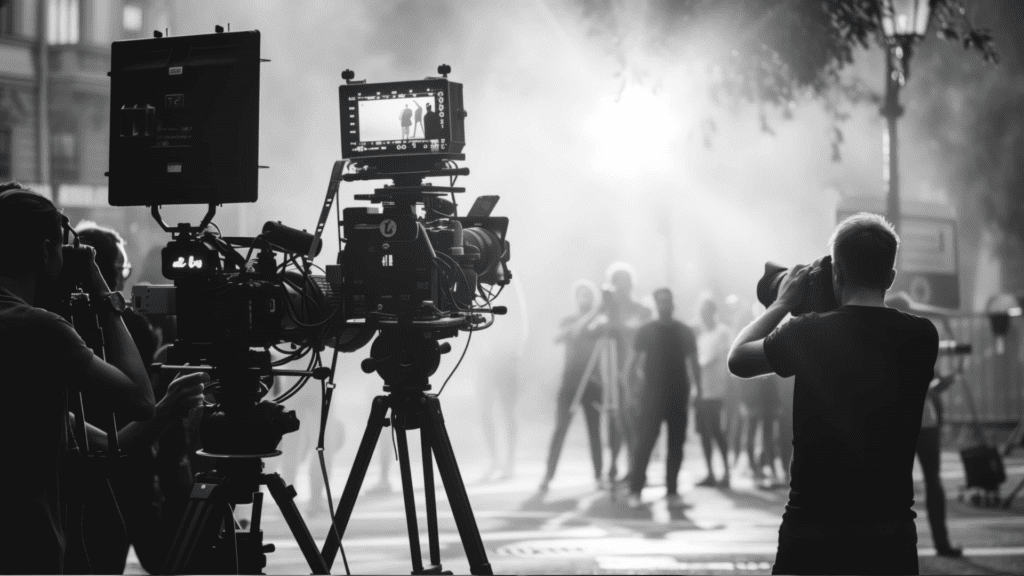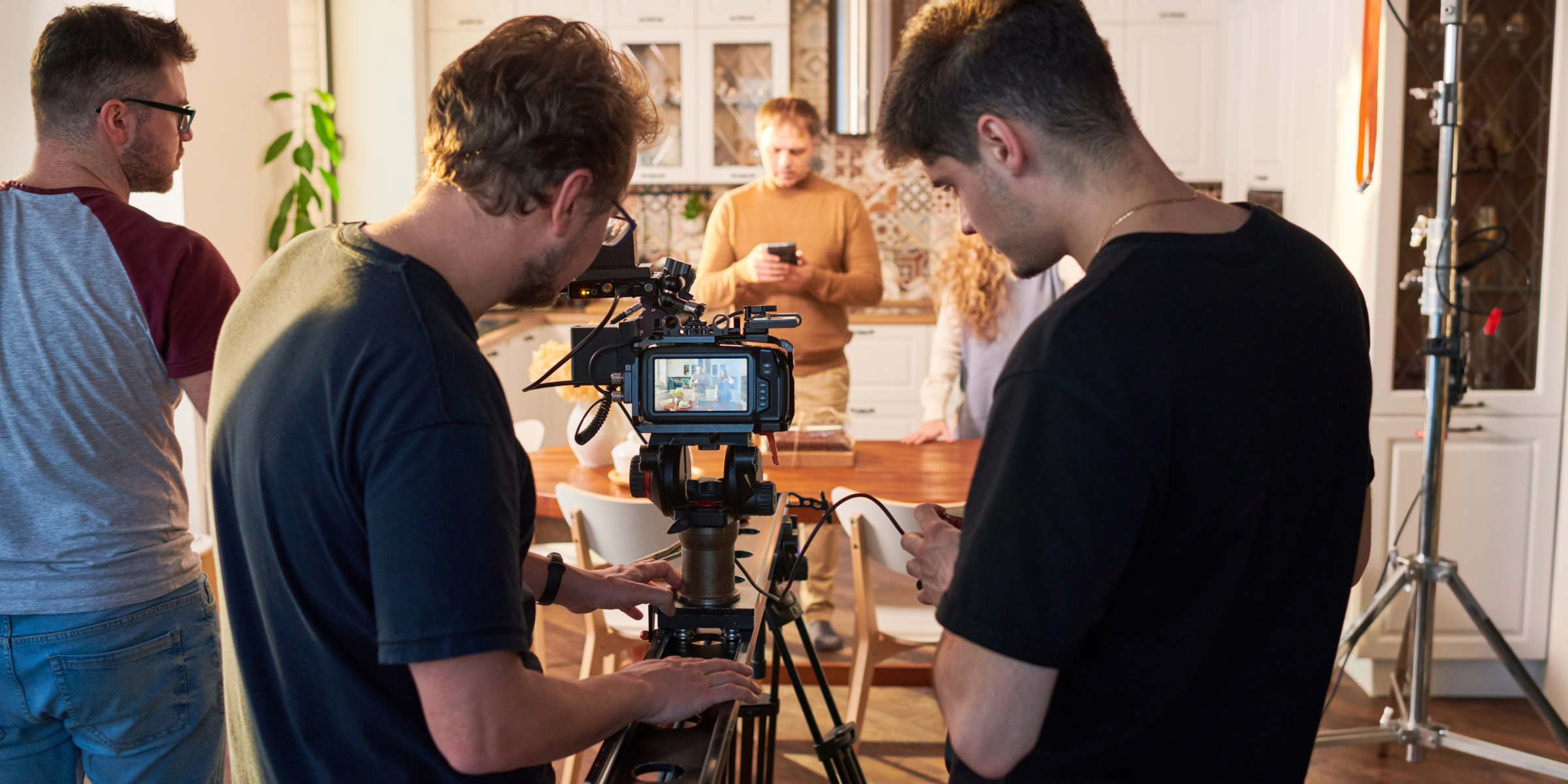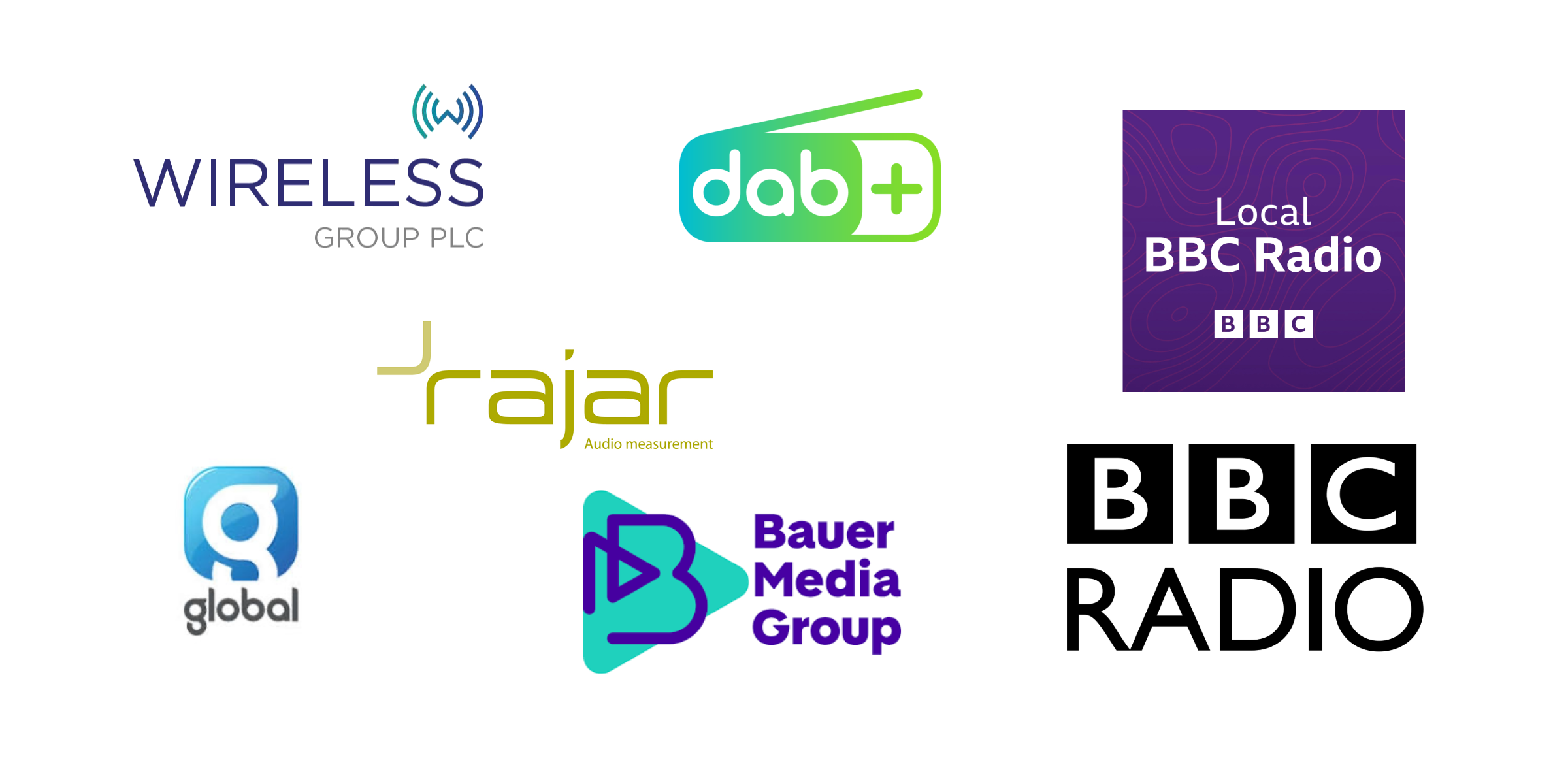In today’s competitive and sometimes saturated landscape, businesses need to develop smart PR strategies to make them stand out to existing and potential customers. And with so many options out there, it can be difficult to work out what will work best for your company.
In this blog we’re going to explore corporate videography, which is a valuable tool you can use to raise brand awareness and connect with your external audience, such as customers and potential new clients, but also your employees and other internal stakeholders
What is a corporate video?
A corporate video is a visual asset professionally created by a company to share information about their products, services, values, or culture, among others.
As mentioned above, the target audience can be internal or external, depending on whether you want to communicate with your employees, investors, current customers, potential clients and even journalists or influencers.
A corporate video can be used as a tool to support areas such as recruitment, marketing, internal communications, and staff training.
A video will enhance the connection between your brand and your audience, and it is certainly more engaging than a power point presentation or a press release.
You can be very creative when it comes to what a professional business video can show. But if you need some inspiration, here are some examples:
- Brand story videos
- Training and onboarding videos
- Event recap videos
- Product launch videos
- Product demo videos
- Case studies and testimonials
- Behind the scenes videos
Types of corporate videos
Brand story videos
A brand story video does exactly what it suggests, which is telling how and when a business was started, dwelling on any challenges faced by the founders and how they overcame them.
Brand stories can be told in first person if the founder(s) are still connected to the business and willing to appear on camera. Alternatively, if the founder(s) are no longer part of the company, the story can be told by a narrator or by other people who were there at the start.
The main goal of this type of corporate video is to create an emotional connection with those watching and it relies on impactful storytelling to get there.
Training and onboarding videos
This type of internal corporate video is used to give new employees information about the company and any crucial knowledge they need to know to be successful in their role.
A good onboarding video will also try to make a new employee feel welcome and valued in the hope to boost their dedication and loyalty to the business.
Event recap videos
An event recap video summarises corporate events such as product launches, conferences, annual general meetings, networking events and even award ceremonies.
The recap will contain the highlights of the event and will capture the atmosphere so those who missed it get a flavour of what happened, perhaps encouraging them to make sure they attend next time!
Product launch videos
A product launch video announces a new product or service with the hope to create excitement and increase sales.
Videos are a great tool to launch a product because of their potential reach and their ability to get people’s attention. Also, a product launch video is an excellent candidate to go viral on social media thanks to the magic of algorithms.
A good example is the 2 to 3-minute video Apple releases every time a new iPhone is about to hit the market, which gets prospective buyers hyped up and talking about the brand. This, in turn, gets journalists writing and some broadcast media coverage as well.
Product demo videos
A product demo can be part of a launch video or a separate thing altogether. However, this type of video goes into a bit more detail about the functionality of the product and its technical features.
A demo can be a great marketing tool for prospective customers but also work as a sort of instruction manual for those which have made a purchase already, which can encourage customers to stay loyal to your brand.
Case studies and testimonials
In this type of brand video, customers and clients speak about their experience working with a business or using their products.
Testimonials can be very powerful at building brand credibility and trust because they feature real stories told by real people.
Behind the scenes videos
We’re all a bit nosy (even if some of us may not admit it) and love getting exclusive access, whether it is to a glamorous film studio or a factory making the nation’s favourite biscuit.
Showing how your flagship product is made or following a team of people organising a big event is the kind of behind-the-scenes content which will appeal to your fanbase and build loyalty. But it can also get the attention of prospective customers who may be curious about what you do.
Benefits of hiring a corporate videographer to produce corporate videos
Some things are best left to the professionals.
Hiring a corporate videographer will ensure you get great results because, simply, they know what they’re doing. An experienced videographer with an extensive portfolio will be best equipped to advise you on your video content strategy and help you execute it.
Corporate video makers are storytelling experts, capable of relaying your key messages in an engaging and, if appropriate, entertaining way.
Outsourcing the production of video content will save you a lot of time because you can delegate the creative process. Depending on the magnitude of the project, one or two initial meetings might be enough to communicate what you want and then hand over the rest.
Plus, you’ll also probably save yourself some money. Unless you already have a video team in-house (unlikely, otherwise you wouldn’t be reading this blog), you’re going to have to hire at least two or three freelancers.
And in terms of equipment, professional videographers come with their own gear, so there’s no need for you to worry about having to hire things like cameras, microphones, or lights.

How to choose a corporate videographer
Experience and portfolio
A candidate’s CV is the first thing you’ll look at when hiring a new employee. So, it should be no different when searching for a corporate video producer.
Check if they have been in business for a long time and whether they have experience producing videos for companies in the same field yours. A corporate videographer who has worked with businesses in your industry and knows the profile of your audience may be a better fit than one who hasn’t.
A good corporate video maker will have some examples of their work on their website and social media. Or, at the very least, will be ready to send some over directly on request. Set some time aside to review their work, paying attention to their shooting style and storytelling. Then consider whether they would be capable of relaying your key messages to your audience in an effective way.
Their creative process
Once you have decided to enquire with someone, some of the main questions you need to ask are about their creative process.
Find out about how the corporate film maker plans and shoots, and the amount of creative direction they require from you. It’s also a good idea to ask about the time it takes them to edit and deliver the final product so you can make sure it aligns with your timeline.
If you want the chance to suggest edits before the final product is delivered, make it clear from the start. Discuss the possibility of doing re-shoots as well.
Whichever the answers, it is essential that you are on the same page, otherwise there may be a bumpy ride ahead. Don’t forget that you’re hiring someone external to make things easier, not harder!
Budget
Corporate videographers will either send you a rate card on request or provide you with a quote after an initial meeting.
It is possible that none of their standard packages fit your project, in which case you’ll need to work with someone who can come up with a bespoke service that suits your specific needs.
In such case, transparency is key when it comes to budgets. Us Brits are not always great at talking about money but, in this context, it is important that you discuss figures from the start – especially if you’re working to a tight budget.
You can even ask for a pricing breakdown, detailing the amounts destined to pre-production, filming, editing and any revisions which may be necessary. Don’t forget to ask about extras such as food and travel expenses, props, location costs or even hair and make-up services for the people appearing in the videos.
Technical equipment
As outlined earlier, one of the benefits of hiring a corporate videographer is not having to worry about sourcing technical equipment yourself. However, you still want to make sure that the professional you go with has the adequate gear to suit your needs.
Ask if they have 4K cameras and how many they’ll be able to use on the project, whether they can provide lapel mics for interviews and shotgun mics for ambient sound, and how many lights they have suitable for filming in indoor spaces. Depending on what you want to shoot, you may even need to ask if they can fly a drone!
Communication and professionalism
Finally, good communication is crucial for a project to run smoothly. A good videographer knows that and will be able to give and receive feedback efficiently. They will also keep you updated throughout the process and have the flexibility to adapt to last-minute changes and deal with unexpected issues.
Generally, you’ll be able to assess somebody’s professionalism and communication skills during the first few interactions with them. Some red flags could be taking too long to provide a quote or changing the figures without explanation. Perhaps they’re always late to meetings or cancel without explanation. Trust your gut.

Should I hire a freelancer or a videography company?
The answer to your question will largely depend on the corporate videography project you want to commission.
Freelancers are a good option for small, one-off projects with no time constraints. However, if you want to kickstart or enhance your video strategy, you need to consider hiring a videography company.
One of the benefits of outsourcing corporate video production to an external company is the access to high quality equipment and specialised teams for each production phase. You can rest assured that the producers scripting, shooting, and editing are experts in their field – leading to a more polished final product.
Because videography companies have access to staff and resources, they are better equipped to handle complex projects and produce video with a fast turnaround. Plus, rest assured that a shooting session will not be cancelled due to illness or travel delays!
Top tips for creating the perfect brand video
Let’s explore some of the areas you can focus on when creating the perfect corporate video.
Define your goals
Have a clear idea of what you want the video to achieve. Whether it’s boosting brand awareness, promoting a product, or providing training for new employees, knowing what the end goal is will help you shape the style and content of the video.
Keep it short and sweet
Less is more when it comes to branded video content. People’s attention spans are getting shorter and shorter so avoid long videos and keep up the pace with the use of different shots, music, animations, and graphics.
Adapt the video for multiple platforms
Gone are the days of producing a branded video which will only go on your website for people to watch from their desktop computers.
Consider the format (landscape or portrait), length and resolution of your video as you want it to be accessible from different devices and multiple platforms. You may want to add subtitles as well so people can watch in public with the volume off.
You may have to create slightly different versions of the same video to maximise reach, but it is worth it.
Include a clear Call to Action
Make sure you include a prompt for your viewers at the end of the video depending on what you want them to do next. Perhaps you want to direct them to your website, or you’d like them to follow your social media channels, or maybe you want them to enter a competition.
Whatever it is, make sure the call to action is clear and leads exactly to where you want your audience to go.

How can Shout! Communications help?
Our corporate video production service employs the latest filming and editing techniques that result in highly polished, motivating films to support your corporate PR strategy.
Our producers and crews have worked in national television and understand the ingredients required to keep an audience engaged.
We have been offering corporate video production since 2003. Our experience means we understand what makes engaging content that works alongside your sales and marketing strategies. Plus, we offer a bespoke service, not just a one-size-fits-all approach!
Get in Touch

Author: Marta Malagon Manas
Marta works on the media relations team at Shout! Communications, securing coverage for clients on radio, television, podcasts and online. She also produces podcasts for clients. She previously worked as a TV and radio producer for ITV and News Broadcasting. She’s a news junkie, always listening to the radio and keeping an eye on the news channels.




